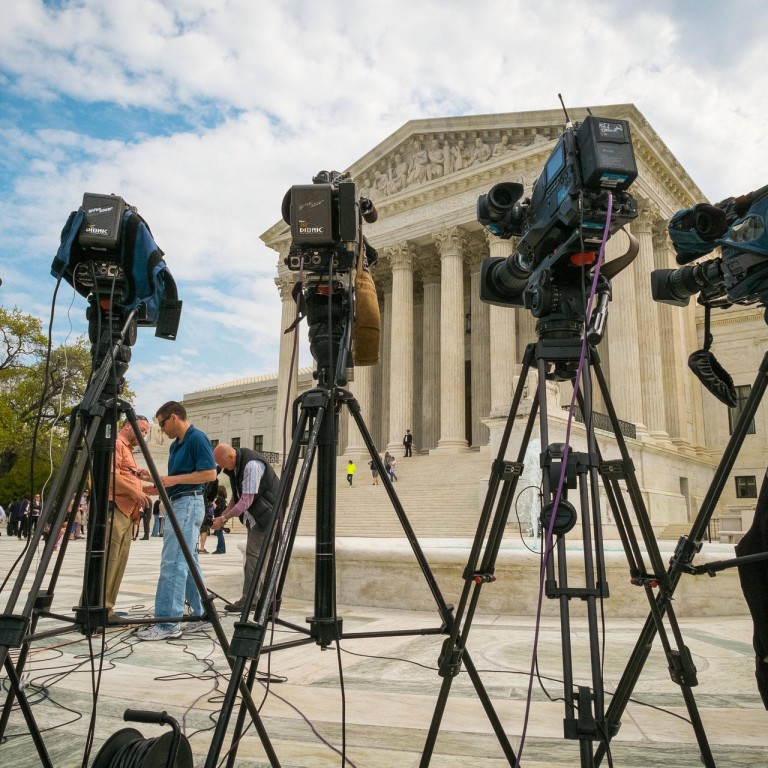
TV industry battles internet viewing start-up in US Supreme Court
US Supreme Court hears arguments over whether Aereo is avoiding royalties or whether technological innovation is more important
A start-up that threatens to shake up the television industry with mini antennas for internet viewing and recording has been the object of heated debate in the US Supreme Court.
A powerful coalition of the broadcast and cable TV industries wants the panel to rule against the start-up Aereo, which allows customers to rent a tiny internet-linked antenna to watch or record over-the-air broadcasts on their computers, raising difficult copyright questions.
At stake are billions of dollars in fees paid by cable and satellite firms, which Aereo circumvents, in what could be the most significant copyright case in decades.
Justices appeared ambivalent at times on Tuesday, questioning whether Aereo was violating copyright law and mulling a possible impact on the burgeoning cloud computing sector, which stores all kinds of materials online.
Justice Stephen Breyer queried what might happen if Aereo were found to be in violation.
"Are we somehow affecting other things such as the cloud?" he asked attorney Paul Clement, arguing on behalf of the plaintiffs including ABC television, the National Association of Broadcasters, Time Warner and others. "I don't see how you get out of it."
Aereo, which is backed by media mogul Barry Diller, launched in early 2012 in the New York area and was immediately sued by the major broadcast networks - ABC, NBC, CBS and Fox - for copyright infringement.
The company, which is expanding to other cities, claims its actions are legal because it is not rebroadcasting, but giving subscribers a personal antenna in its New York warehouse that enables them to watch live TV or record it for later viewing.
A US appeal court panel agreed with Aereo, ruling it was not retransmitting "public performances", which would be banned under copyright law, but merely allowing customers to rent antennas to receive and record free broadcasts.
Clement urged the justices to put aside the issue of cloud computing and consider the copyright issue, claiming Aereo gets around royalty fees that similar services such as cable must pay.
But Chief Justice John Roberts pondered the Aereo argument that it was merely renting equipment that a consumer could use legally.
"You can go to Radio Shack and buy an antenna and a DVR [digital video recorder], or you could rent those facilities somewhere else from Aereo."
This point was emphasised by lawyer David Frederick, arguing for Aereo.
"We are not a cable service," he said. "Aereo is an equipment provider."
The lawyer said Aereo allowed consumers "to replicate in the cloud what they could do on their own".
While the justices expressed concern about affecting the cloud computing industry, some also voiced scepticism about whether Aereo was designed as a ruse to evade retransmission fees.
Roberts said: "Your technological model is based solely on circumventing legal prohibitions that you don't want to comply with."
Much of the debate centred on whether Aereo was in fact transmitting a signal, which would be a "public performance" under copyright law.
The US government, backing the broadcasters, argued that Aereo was in fact a transmission service and violated US copyright law.
Deputy Solicitor General Malcolm Stewart told the justices that Aereo was similar to cable television that used "one big antenna" and "ought to be paying royalties".
Some broadcast executives have threatened to end over-the-air transmissions, which would force consumers to watch those channels either on cable or satellite.
The Computer and Communications Industry Association, which represents tech giants Google, Facebook and Yahoo, is supporting Aereo. "The case has ramifications reaching far beyond the future of Aereo and change-resistant broadcasters," said CCIA president Ed Black.
The justices are expected to issue a ruling by the end of June.

